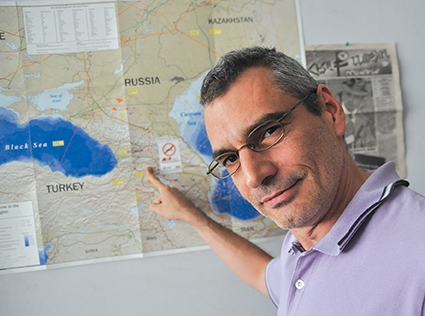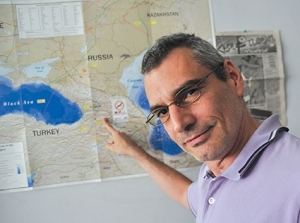Giragosian: Russia is taking Armenia for granted
Interview
Armenia’s foreign policy is rife with security dimensions. On the one hand, it hosts a Russian military base, yet on the other it has close relations with NATO. We met with Richard Giragosian, the Founding Director of the Regional Studies Center (RSC), an independent “think tank” located in Yerevan, Armenia, Senior Expert at Yerevan State University’s Center for European Studies (CES) and a contributing analyst for al Jazeera and Oxford Analytica, a UK-based global analysis and advisory firm.
What guides Armenia’s rather unique security strategy?
For Armenia, the guiding principle for defense, military security, economic development and foreign policy is defined by a “small state” strategy designed to seek “balance” between the competing interests of much greater regional powers, such as Turkey, Russia and Iran. For Armenia, this quest for balance also involves efforts to maximize strategic options, as evident in the country’s approach to managing the inherent contradiction of maintaining a close relationship with Russia while deepening ties to the West.
Obviously, the danger for Armenia stems from the now apparent over-dependence on Russia, whereby, after several years of a steady mortgaging of Armenian national interest, involving the Russian acquisition of sectors of the economy, a reliance on Russian gas imports, and more structurally, Armenia’s position as Russia’s foothold in the South Caucasus, have combined to upset that delicate balance.
After the 2014 Russian invasion of Ukraine, Russia has done quite well losing friends rather than making them. As a result of sanctions, the Kremlin’s imperial ambitions have been humbled. Wath is Russia up to with Armenia?
Armenia is the host of the only Russian base in the region, a member of the Collective Security Treaty Organization (CSTO) and, most recently, of the Eurasian Economic Union (EEU).
Although Armenia has sought to avoid being caught in the broader confrontation between Russia and the West, the impact from the Russian annexation of Crimea and Moscow’s aggressive actions to support a war in Ukraine have been fairly significant.
But the most dynamic factor for Armenia has not been Ukraine, but rather, Russia’s policy to arm Azerbaijan. Moreover, there is a deepening crisis in Armenian-Russian relations, driven by various factors, but most notably due to Armenian resentment over Russian arms sales to Azerbaijan and frustration over the inadequacy of faith in Russian security promises after the April 2016 “four-day war” over Nagorno-Karabakh. The crisis is also deepened by the degree of arrogance and asymmetry with which Russia “takes Armenia for granted”.
How does Armenia’s membership in the EEU, and the Eastern Partnership define the nature of the country’s national security?
In terms of overall national security, Armenia is seeking to garner greater strategic alternatives. This is seen first in the country’s move to overcome the setback from the forced sacrifice of its Association Agreement with the EU following Russian pressure on it in 2013.
In March, Armenia was able to regain European confidence and, in a rare “second chance,” was able to “initial” a new EU-Armenia Comprehensive and Enhanced Partnership Agreement (CEPA). This new EU-Armenia CEPA presents a fresh start for the deepening of relations between the two parties. Despite a difficult and complicated context, both the EU and Armenia have demonstrated the necessary political will to negotiate a new compromise agreement that takes into account Armenia’s commitments and limitations as a member of the Eurasian Economic Union.
Despite the huge popularity of pro-European block “Tsarukian”, Russian funded ruling political parties and investments dominate the Armenian economy. Are Yerevan’s European aspirations under the Kremlin’s thumb?
Unlike many of the former Soviet states, where Russia’s reliance on instruments of “soft power” have triggered serious concern, in the case of Armenia, the limits of Russian power are evident. You can say that Russian soft power in Armenia is neither soft, nor very powerful.
I think that the main point to be made is that, from a broader perspective, the effective application of Russian soft power is inherently limited. There is little genuine appeal or attraction for the post-Soviet countries. Many, if not all, these countries are merely seeking to manage the threat of a resurgent Russia. Even for the more authoritarian states, appeasing Moscow is about regime survival.
What values drive the formation of Russian foreign policy towards Armenia?
In the battle of ideas and ideals, Russia offers little in terms of values. The Russian position is one of threat and coercion. This stands in stark contrast to Western or European ideals of attraction or seduction, based on values of political pluralism and opportunities for economic prosperity.
Against this backdrop, it is also clear that Russia’s position stems from one of weakness, not strength, is driven by insecurity not confidence, and is rapidly exhibiting signs of dangerous over-extension. These fundamental weaknesses of Russia’s much heralded, but often exaggerated soft power are most evident in Armenia.
For Russia’s approach toward Armenia, there has been a heavy reliance on instruments of hard power, exploiting Armenian military insecurity over the unresolved Nagorno-Karabakh conflict with Azerbaijan and manipulating the country’s economic insecurity. The Karabakh conflict remains the simplest instrument for leverage over both Armenia and Azerbaijan, with Armenia as a willing recipient of Russian security promises and cheaper weapons, and Moscow now as the number one arms provider for Azerbaijan.
Speaking of opportunities, would you consider China’s New Silk Road a stroke of geopolitical luck for Yerevan?
For Armenia, as the smallest country in the region, the strategic opening of the Belt Road Initiative offers an important reversal of decades of exclusion and reaffirms the imperative for overcoming the country’s pronounced geopolitical and geo-economic landlocked status. And yes, it is a “stroke of luck” in terms of a rare case where Armenia’s geography is less a prison and more a promise for economic engagement.
Although the pace of closer Armenian-China relations has accelerated in recent years, Chinese interest and engagement in Armenia is not necessarily a new or novel development. For example, China has provided economic aid to Armenia every year since 1999, and in terms of bilateral trade, Armenia has also embarked on a low-profile effort to turn to China.
This has also been surprisingly successful, as China recently emerged as Armenia’s second-largest trading partner, as bilateral trade increased to some $480 million in 2015 according to official Armenian statistics. But the most important element of Armenia’s strategic “pivot to China” is not limited to trade. The emergence of a more robust military and security relationship with China stood out as an equally significant achievement for Armenia. More specifically, despite its security partnership with Russia, Armenia is seeking an alternative to an over-reliance on Russia.
The newly launched Baku-Tbilisi-Kars (BTK) railway bypassed Russia and Armenia. Some experts believe that it may intensify Armenia’s isolation. Do you think that those fears are merited?
China seeks to recapture the dynamism and repeat the display of the globalized benefits from an Asia-centered trade network. Such a revitalized “Silk Road” also offers a chance of “connectivity” for formerly remote and isolated regions, and an opportunity for connectivity over conflict and trade integration over destruction, essential for regions like the South Caucasus.
For the three countries of the South Caucasus, the sheer scale and scope of this initiative reinforces a broader strategic vision that has been demonstrably lacking. And for each of the three states, there are unique opportunities which only foster a convergence of mutual interests over the more traditional conflict that has impeded all efforts at restoring regional trade reinvigorating economic cooperation.
Paradoxically, the membership in the Russian-dominated EEU may offer an advantage. More specifically, as an EEU member state, Armenia can offer a degree of dual access, for the BRI to attract interest from other EEU members using Armenia as a platform, and also as a mechanism for the BRO to widen its reach by utilizing Armenia as a bridge into much larger markets and to link to the vaster Russian transport networks.
Malgosia Krakowska is a Polish journalist focusing on international security issues
By Malgosia Krakowska
Photo source: eurocaucasusnews












